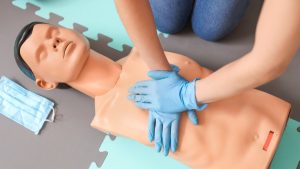Articles / Survey: Widespread medication shortages are taking a toll

Shortages of crucial medications including Ozempic, antibiotics, warfarin and others are widespread, and many patients are suffering as a result, Healthed’s latest survey suggests.
The results showed that 42% of GPs have five or more patients who have experienced negative health outcomes due to medication shortages in the past six months—and 72% of GPs have had at least one patient in this situation.

Nine out of ten surveyed GPs (91%) reported that their patients are having difficulty accessing Ozempic (semaglutide), and many also cited Trulicity (dulaglutide), which had been recommended as an alternative to Ozempic.
Over half of GPs (53%) reported that their patients are having difficulty accessing antibiotics. Current shortages include amoxicillin, cefalexin and metronidazole, with 39 brands unavailable, according to the TGA.
Almost one in ten GPs reported shortages of warfarin, and a similar number said patients have had trouble accessing EpiPens.
Additionally, 23% cited shortages of Ditropan (oxybutynin hydrochloride); the TGA says this has been resolved as of mid January, after more than seven months.
GPs described real harms as a result of the shortages.
In the free text responses, one doctor told of their patient who was “unable to afford the increased pads required” when Ditropan was unavailable, and experienced “huge family distress over her wet sheets every morning and she refused to leave the house for three months. She tried other products without success –Ditropan patch was ineffective and alternative products were too expensive.”
Many GPs expressed concern about patients with diabetes regaining weight and experiencing deterioration of glycaemic control due to the Ozempic and Trulicity shortages. In some cases, patients experienced troubling side effects when switching to alternative medications.
Several GPs were frustrated that patients were having to settle for less effective antibiotics for an infection, and said the challenges were especially pronounced for those with allergies to alternative antibiotics.

The shortages have added to the burden on both patients and GPs in a number of ways. In one case, a patient travelled four hours to fill a BACTRIM script. Overall, three quarters of surveyed GPs (74%) said that patients typically go to multiple pharmacies to try and fill a script when there are medication shortages, which takes time and may or may not be successful—and 59% said patients come back to them for advice. Apart from this increased time burden, there is also potential increased risk of harm with 9% of GPs saying their patients try to buy the medicines online.
The survey showed no significant differences between GPs in different states or different locations, suggesting that these shortages are Australia-wide and not confined to regional locations.
Meanwhile, responses from GPs suggest that information on medication shortages is not easily sourced and tends to be via informal channels—GPs frequently only find out about shortages when their patients are impacted and let them know.
Where do things stand now?
Supplies of Trulicity are expected to return at the end of March, and the TGA has said limited stock of Ozempic is starting to return to pharmacy shelves, though supply of the latter “will remain quite limited for some time”.
The shortages of warfarin affect 2mg and 5mg tablets of Coumadin—while the 2mg tablets are expected to be back in stock by 20 March, the 5mg pills are not expected until 31 July. The TGA says that Marevan is not bioequivalent to Coumadin, and is not considered interchangeable. In cases where switching or substituting is unavoidable, they recommend close monitoring with frequent INR testing.
The TGA has not announced a date when they expect the antibiotic shortage to be resolved, but have developed a list of alternative products that can be used in the interim.
The limited supply of some types of adrenaline (epinephrine) acid tartrate autoinjectors is expected to be resolved in mid to late April. Alternative brands are available in the meantime.
Do you have experiences to share about medication shortages? Email editor@healthed.com.au
A total of 1,449 GPs have responded to Healthed’s survey so far, which opened on 7 March 2023. GPs are allowed to skip questions, which is why each question has a different number of GP participants.
Survey conception and design– Dr Ramesh Manocha
Survey analysis, visualisation, and reporting– Yasmin Clarke
Editing – Lynnette Hoffman


Fracture Prevention and Osteoporosis Management After Menopause

Ophthalmology Update: New Treatments for Old Conditions

Testosterone for Men – Common Myths and Recent Development

Conversation Strategies for Unfunded Vaccinations



Yes, if the referral process involves meaningful collaboration with GPs
Yes
No
Listen to expert interviews.
Click to open in a new tab
Browse the latest articles from Healthed.
Once you confirm you’ve read this article you can complete a Patient Case Review to earn 0.5 hours CPD in the Reviewing Performance (RP) category.
Select ‘Confirm & learn‘ when you have read this article in its entirety and you will be taken to begin your Patient Case Review.